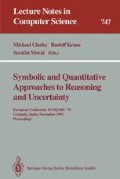Abstract
Causal Probabilistic Networks (CPN), a method of reasoning using probabilities, has become popular over the last few years within the AI probability and uncertainty community. This paper begins with an introduction to this paradigm, followed by a presentation of some of the current approaches in the induction of the structure learning in CPN. The paper concludes with a concise presentation of alternative approaches to the problem, and the conclusions of this review.
This work was supported by grant from the Gobierno Vasco — Departamento de Educación Universidades e Investigación PGV 92-20
Preview
Unable to display preview. Download preview PDF.
References
Aarts E.H.L., Korst J.H.M. (1989) Simulated Annealing andf Boltzmann Machines. Wiley, Chichester.
Acid S., De Campos L.M., Gonzalez A., Molina R., Perez de la Blanca N. (1991) Learning with CASTLE, in Symbolic and Quantitative Approaches to Uncertainty. Lectures Notes in Computer Science 548R. Kruse, P. Siegel (Eds.). Springer Verlag 99–106.
Andersen L.R., Jens H.K., Andersen D. (1991) Steno: an expert system for medical disgnosis based on graphical models and model search. Journal of Applied Statistics Vol 18, n 1, 139–153.
Chow C.K., Liu C.N. (1968). Approximating discrete probability distributions with dependence trees. IEEE Trans. on Info. Theory IT-14, 462–467.
Cooper G.F., Herskovits E.A. (1992) A Bayesian Method for the Induction of Probabilistic Networks from data. Machine Learning vol 9, 309–347.
Fung R.M., Crawford S.L.(1990) Constructor:A system for the Induction of Probabilistic Models. Proceedings of AAAI 762–769
Glymour C., Schemes R., Spirtes P., Kelly K. (1987) Discovering Causal Structure. New York: Academic Press.
Goldberg D.E. (1989) Genetic algorithms in search, optimization, machine learning. Addison-Wesley.
Herskovits E., Cooper G.(1990) Kutato:An Entropy-Driven System for Construction of probabilistic Expert Systems from Databases. Knowledge Systems Laboratory.Medical Compuetr Science.Stanford University. Report KSL-90-22
Malvestuto F.M. (1991) Approximating discrete probability distributions with descomposable models. IEEE Transactions on systems, man, and cybernetics Vol. 21, No. 5, 1287–1294.
Michalewicz Z. (1992) Genetics Algorithms + Data Structures = Evolution Programs. Springer-Verlang.
Neapolitan R.E. (1990) Probabilistic reasoning in Expert Systems. Theory and Algorithms. John Wiley & Sons, Inc.
Pearl J. (1988) Probabilistic reasoning in intelligent systems San Mateo CA: Morgan Kaufmann.
Pearl J. (1993) Belief networks revisited. Artificial Intelligence 59. 49–56.
Rebane G., Pearl J. (1989) The recovery of causal poly-trees from statistical data. Uncertainty in Artificial Intelligence 3 175–182.
Author information
Authors and Affiliations
Editor information
Rights and permissions
Copyright information
© 1993 Springer-Verlag Berlin Heidelberg
About this paper
Cite this paper
Larrañaga, P., Yurramendi, Y. (1993). Structure learning approaches in causal probabilistics networks. In: Clarke, M., Kruse, R., Moral, S. (eds) Symbolic and Quantitative Approaches to Reasoning and Uncertainty. ECSQARU 1993. Lecture Notes in Computer Science, vol 747. Springer, Berlin, Heidelberg. https://doi.org/10.1007/BFb0028204
Download citation
DOI: https://doi.org/10.1007/BFb0028204
Published:
Publisher Name: Springer, Berlin, Heidelberg
Print ISBN: 978-3-540-57395-1
Online ISBN: 978-3-540-48130-0
eBook Packages: Springer Book Archive

